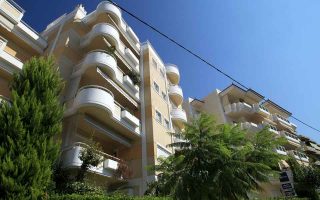Greek furnished rental startup Blueground enters the unicorn club

Furnished rental startup Blueground has joined the unicorn club – companies whose value exceeds 1 billion dollars – its CEO and co-founder tells Kathimerini. After announcing in March that the company had secured $45 million in Series D funding from major investors, Alex Chatzieleftheriou talks about Blueground’s plans to grow its goal of surpassing 40,000 apartments in 50 cities by 2025, the prospects of its listing on the US stock market, as well as the strategy it is following on its path to profitability.
At the same time, almost 10 years after its founding, he discusses the difficulties the property management company faced during the implementation and development of the venture, the shock caused by the collapse of Silicon Valley Bank, but also the progress of the Greek ecosystem of startups, which he himself supports, having financed new ideas.
You recently raised $45 million in capital from new and existing investors through a share capital increase. How will you use these funds?
Our key investor in this funding round was Susquehanna Private Equity Investments, known for its investment in ByteDance, parent company of TikTok. It is essentially a large investor, investing in both listed and unlisted companies, such as Blueground. This particular round of financing is for us a bridge that will allow us to enter the US stock market, when we finally decide to make such a move. With these funds we therefore look forward to strengthening our technology in order to support new models, through which we enter new markets and increase the number of furnished apartments we offer for rent to our customers, whether private or corporate. Blueground enables visitors to stay in a city for a month or more by renting a furnished and fully equipped apartment. In other words, they do not need to go to a hotel, nor to look for an apartment or furniture to equip and rent it for the period they want it. With our solution, they save money and time. So now, in addition to our original strategy model – that of renting apartments, furnishing and subletting them for a month or more – we are expanding into new markets, through franchise agreements as well as a network of our local partners in different countries.
At the same time, you raised $40 million by refinancing your previous loan from Silicon Valley Bank, which collapsed in March 2023. How did you react to hearing this news?
The bankruptcy of SVB was a shock for us, as for all startups, since we had exposure to the bank, deposits, lending etc, but we reacted quickly, withdrawing our deposits. However, the bank was eventually acquired and assets were protected. On the lending side, a very important development is that Barclays, Morgan Stanley, Deutsche Bank and HSBC refinanced our loan at a much lower cost of borrowing than we previously had.
So can we officially call you a unicorn? Have you achieved a capitalization of more than 1 billion dollars?
Yes, the company is now worth just over $1 billion. Certainly this has value for us, and is a great success. Of course, at the moment we are focusing, beyond growth, on achieving significant profitability. In the recent past, there have been several technology companies that, while achieving high valuations, were unable to prove that they had a sustainable business model. There were three cases of companies: on the one hand, those that had this valuation, but when their investors asked them to turn to profitability, they could not do so because their business models were not sustainable; others that had sustainable growth models, but had to put the brakes on their rapid growth and reduce losses; and finally companies like us, who are able to continue to grow and have a sustainable and profitable business model.
Earlier you also mentioned your new strategy models. How do you build your network of properties and how do you manage them? Is it true that you are gradually moving toward an asset-light model?
When we started the company, we saw a gap in the market. There was not enough supply of furnished apartments to rent for a month or more. So we had to find a way to market more apartments, and we started building a network from scratch. We know how to rent apartments, furnish them, promote them, price them etc. So our vision is to continue to develop a wide and global network of apartments to serve our customers. Thus, today we have in our portfolio 15,000 apartments in 32 cities in 17 countries around the world, in the US, Asia, the Middle East, Europe etc. Our basic model (rental – furnishing – decoration – subletting) requires large investments in order to operate efficiently in many countries.
Thus, we announced two more models: the franchising agreements and the partner network. Through franchise agreements we expanded to Japan and also to Thailand. For example, in Japan we reached an agreement with the Mitsubishi Real Estate Company, which is one of the biggest players in real estate. It plans to develop a network of 13,000 furnished apartments in major Japanese cities under the Blueground Japan brand. In other words, we now have a partner who has knowledge of the specific market in Japan, provides the capital as well as the team, while we supply it with know-how and technology. This is how we develop in new markets faster and with the help of excellent partners.
With this model we also entered another market, in Cairo. At the same time, through a network of local partners located in various markets where we operate or in new ones, we offer our customers a greater number of apartments. These partners must have a high level of service, offer a quality product and apartments in suitable locations. These are win-win partnerships, since we also give our customers/visitors more options, and our partners increase the demand for the apartments they manage.

Will you enter new markets?
We will also enter the Czech market through franchising, while in 2024-2025 I believe we will expand through franchise agreements in more than 10 cities in Asia, the Middle East, possibly Oceania, Africa, Latin America and Eastern Europe.
Will you achieve your goal of reaching 40,000 apartments in 50 cities by 2025?
Yes. As we add these partnerships, I think we will meet and exceed it by the end of 2025.
You also made three acquisitions. With the acquisition of Brazilian proptech startup Tabas in 2022 you expanded into the South American market. Will others follow?
We don’t have a specific plan for another acquisition, but it is possible that we will do another one in the future. We do not make opportunistic acquisitions and all were based on the same vision: to build and develop the largest network of high-quality furnished apartments for stays of one month or more.
Is there a date for your listing on the US stock exchange?
When we feel the time is right. That is, when the markets allow it and our turnover and profitability reach the levels we want, then we will do it. It is not an end in itself.
You have over 1,000 apartments in areas of Athens such as Glyfada, Halandri, Kolonaki, Vouliagmeni etc. What is the profile of those who choose Blueground?
There are various categories of visitors who choose our service, but the main one are professionals who move to Athens and are looking for an easy solution for their stay. Also, there are Greeks living abroad who come in the summer and work remotely. Our occupancy rates now reach 96% in Athens, while [the number of] our apartments is constantly increasing. Depending on the year, we add approximately 100-150 apartments per year.
You recently made cost cuts, while several of your competitors have not been able to survive.
Blueground today numbers a total of 1,000 people worldwide, of whom approximately 400 are located at our offices in Athens. Here we have a technology team of 100 people that includes developers, product managers, designers etc. This is where we develop our technology and provide services to the group for all the international markets we operate in. However, times have changed. Until 2022, funding from venture capital funds to startups registered an upward trend, while 2021 was a year where there was a cumulative withdrawal of capital from startups. However, in the last two years, inflation as well as borrowing costs have increased, resulting in a reduction in financing. So we were called upon to make quick changes, reduce costs and focus on achieving profitability. In this context, we also made changes, reduced our costs and worked hard to become more efficient in our entire range of operations.
And what is your turnover now? Are you profitable?
Last year our turnover increased by 70% to 560 million dollars, of which 65% came from the US market. We essentially collect rents from tenants and our clients are either companies or individuals. The ratio between these two categories is 50-50. We work with more than 4,000 businesses, including the biggest tech companies, banks etc, who rent our apartments for their executives. Regarding profitability, in 2024 we estimate that we will be profitable. In 2023 we were at breakeven in the second half of the year.
What difficulties have you faced in the last decade and what are your goals from now on?
This decade was a period of maturation for me. The Covid-19 pandemic and the collapse of Silicon Valley Bank were some of the most difficult times we faced. During the pandemic we matured, we lowered our costs and at the same time managed to increase our income, but we had to make difficult decisions and adapt quickly to the new conditions. Our main challenge this decade has been to set our project right and turn to profitability. We succeeded and now it is difficult for anyone else to achieve something similar. In general, taking stock, I believe that the first decade was excellent and the second one, which has started now, will be even better.
How do you evaluate the Greek startup ecosystem?
Since Blueground was founded in 2013, I have seen huge leaps in the startup ecosystem. I see more venture capital funds as well as many notable companies. I personally have invested in Greek startups, because some have, I believe, significant growth prospects. The Greek ecosystem of startups may not have reached the size of other ecosystems, as is the case of Israel for example, but it has shown significant improvement with performances better than those of other neighboring countries. Besides, entrepreneurship is very important for Greece, as for all countries, as economies that do not innovate shrink over time.





